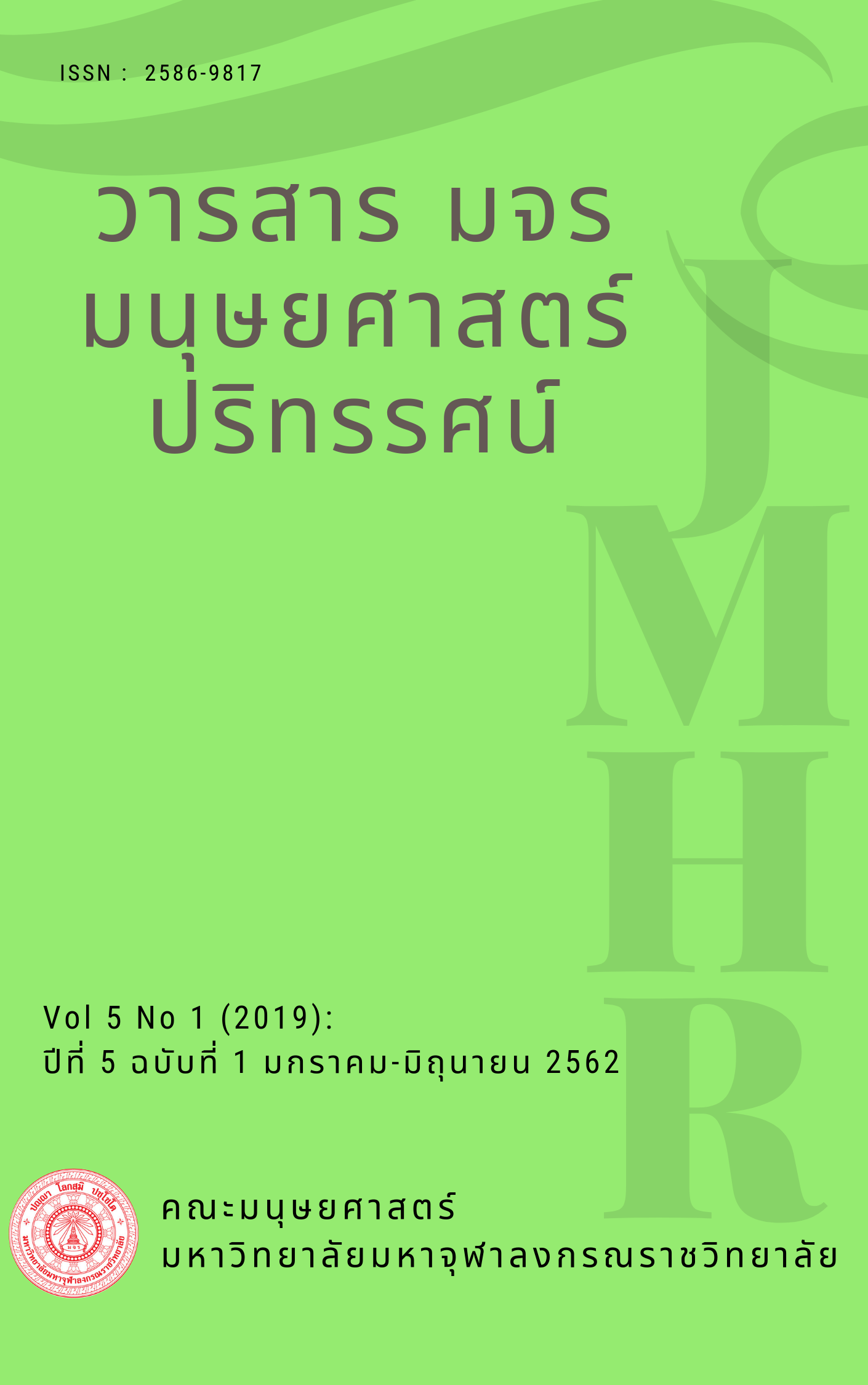ภาษากับจิตใจในด้านการเสริมแรงทางบวก
คำสำคัญ:
การเสริมแรงทางบวก, ภาษากับจิตใจบทคัดย่อ
บทความนี้มีวัตถุประสงค์เพื่อศึกษา ภาษากับจิตใจ ในด้านการเสริมแรงทางบวก เพื่อเป็นแนวทางให้พุทธศาสนิกชนได้มีเป้าหมายในการฝึกฝนตนและขัดเกลาจิตใจตน อีกทั้งยังสามารถนำไปใช้ให้เกิดประโยชน์ต่อตนเองทั้งในปัจจุบันและในอนาคตต่อไปได้ ในบทความนี้มุ่งศึกษาเฉพาะภาษาที่ปรากฏในบทสวดในพุทธศาสนาเท่านั้น ภาษากับจิตใจในด้านการเสริมแรงทางบวกนั้น มีผลต่อ ความคิด อารมณ์ และพฤติกรรมของพุทธศาสนิกชน ในสถานการณ์ต่างๆในชีวิตประจำ พุทธศาสนิกชนสามารถจดจำบทสวดจากพิธีกรรมต่างๆทางศาสนาได้ จาการสำรวจพุทธศาสนิกชนที่เป็นกลุ่มตัวอย่างมีการเสริมแรงทางบวกจากข้อความถ้อยคำที่ปรากฏในบทสวด โดยรวมอยู่ในระดับมาก โดยการเสริมแรงทางบวกในระดับตัวภาษาและในระดับสถานการณ์ในชีวิตประจำวัน โดยรวมมีค่าเฉลี่ยมากสุด ทั้งการเสริมแรงทางบวกเชิงบูรณาการและการเสริมแรงทางบวกเชิงเครื่องมือ แต่การเสริมแรงทางบวกในระดับตัวพุทธศาสนิกชนที่เป็นกลุ่มตัวอย่าง อยู่ในระดับปานกลาง ส่วนปัจจัยที่มีผลกระทบต่อการเสริมแรงทางบวกจากข้อความถ้อยคำภาษาที่ปรากฏในบทสวดพบว่า เพศไม่มีผลไม่มีอิทธิพล หรือไม่มีความสัมพันธ์ต่อการเสริมแรงทางบวก ในขณะที่ อายุ ระดับการศึกษา และความสนใจในปัจจุบันของพุทธศาสนิกชนที่เป็นกลุ่มตัวอย่างมีผลมีอิทธิพล หรือมีความสัมพันธ์ต่อการเสริมแรงทางบวก ในชีวิตประจำวัน จากผลการศึกษาดังกล่าว ชี้ให้เห็นว่า ภาษากับจิตใจโดยเฉพาะข้อความถ้อยคำรุปแบบภาษาที่ปรากฏในบทสวดพุทธศาสนา เป็นการเสริมแรงทางบวกชิงบูรณาการ และสามารถพัฒนาไปสู่การเสริมแรงทางบวกเชิงเครื่องมือได้
เอกสารอ้างอิง
กาญจนา แก้วแทพ และนิคม ชัยขุนพล. 2552-2555. กระบวนทัศน์ใหม่ของสื่อสารไทยศึกษา.โครงการวิจัย. สำนักงานกองทุนสนับสนุนการวิจัย. กรุงเทพฯ : โรงพิมพ์ภาพพิมพ์
คงศักดิ์ วัชรคงศักดิ์, ชนะมะเร็งขั้นสุดท้ายด้วยธรรมชาติบำบัด หลัก9 อ. ชนะมะเร็งฯลฯ, พิมพ์ครั้งที่6, (กรุงเทพมหานคร: มูลนิธิ เจ้าพระยาต้านโรคร้าย ด้วยธรรมชาติบำบัด. 2555)
สุจริตลักษณ์ ดีผดุง, วัจนปฏิบัติศาสตร์เบื้องต้น, พิมพ์ครั้งที่ 2, (กรุงเทพฯ : ห้างหุ้นส่วนจำกัดสามลดา, 2552)
ภาษาอังกฤษ
Austin, John L., How to do things with words. (USA: Harvard University Press, 1975).
Dörnyei, Z. 2001. Motivational strategies in the language classroom. Cambridge: Cambridge U. Press
Gardner, R.C., & Lambert, W.E. 1972. Attitudes and motivation in second language learning. Rowley, MA : Newbury House
Masters KS, Spielmans GI. Prayer and health: Review, meta-analysis, and research agenda. J Behav Med. 2007; 30(4): 329-38.
Searl J., Indirect Speech Acts In: Cole, P. and Morgan, J (eds.) Syntax and Semantics 3: Speech Acts, (New York, NY: Academic Press, 1975).
Skinner, B. F. (1969). Contingencies of reinforcement. New York: Appleton-Century-Crofts.






